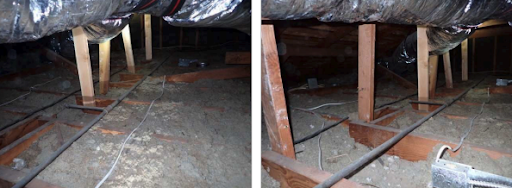Recently, I was contacted by a divorcing couple to list their home. They bought the house with a different REALTOR® in 2019, and I was thankful that a mutual friend referred me to them before they reached out to their previous agent.
After a few weeks of discussion and planning, the sign went up, and the home was listed on MLS. We had several showings, and three offers came in. All of the offers were over the list price. One of them came in really strong at $25,000 over, waiving loan and appraisal contingencies, ten days to complete inspections, and 25 days to close escrow. The sellers jumped on it, and we opened escrow.
The buyer loved the house and was excited to make it his home. The home inspection was scheduled for day seven of the escrow period at 2 PM. That was when the “fun” started…
At 2:30 PM, I received a call from the buyer’s agent asking questions about the remodel that had been performed and when it had been done. The seller had bought the house from a “flipper” who had completed a massive renovation. During that renovation, a wall was removed to open up the kitchen, and the ceiling had started to sag over time.
Unbeknownst to the current sellers, that wall was load-bearing, and the buyer’s home inspector was able to identify that the ceiling had been improperly supported after the wall removal. The sellers hadn’t given much attention to the bit of cracking going on in the sheetrock above their kitchen island. Now they understood there was something seriously wrong — and it was their problem to deal with.
The sellers were stunned. They didn’t understand why they had not been made aware of the issue when they purchased the home just two years earlier. I asked if they had the inspection reports from their purchase that we could review. Not that having them would have changed the situation facing them now, but they could not find them.
At this point, they were looking at a $10,000 estimate to install a 16-foot beam and correct the problem, cutting deeply into the $25,000 they had received over the list price. Disappointed at those they relied on to help them through the purchase process previously, the sellers had no other choice but to move forward and pay for the correction.
Good inspectors and their inspection reports are the only paper trail we have to understand a home’s physical condition. While the inspections are technically the buyer’s responsibility, buyers rely on the inspectors and their agent’s experience to help them understand the reports and what they may be facing. In this case, we saw the results of two very different buying processes for the same house. One where the buyer’s investigation of the house identified a serious issue, and the other where the buyers’ investigation of the house did not.

There are several inspections a buyer can perform when purchasing a home. Each requires a different type of inspector to complete them.
Top 7 Inspections to Perform When Buying a Home
Here are our recommendations for the most critical inspections to have completed when purchasing a home in the greater Sacramento area.
Home Inspection - A home inspection gives an overview of a home’s electrical system, plumbing, foundation, roofing, heating, air conditioning, ductwork, exterior condition, patios and decking, and perimeter. Home inspectors are not contractors. They don’t give repair estimates. Their inspections are strictly informational and critical to understanding a home's overall condition. I recommend using only a California Real Estate Inspection Association (CREIA) certified inspector.
Wood Destroying Organisms Inspection (Pest Inspection) - A pest inspection provides information regarding wood-destroying insects, such as termites, wood-boring beetles, carpenter ants, and carpenter bees, as well as dry rot, surface fungus, and conditions that contribute to issues such as plumbing leaks, faulty grading, earth-to-wood contact, and other moisture conditions. A pest inspection typically includes a repair cost estimate.
Roof Inspection - A roof inspector focuses on the structure and health of a roof, including its age, materials, installation, flashing, gutters, valleys, pitch. A roof inspector also looks for any penetrations. A roof inspection typically includes an estimate for repair costs as well as an offer for a 2-year roof certification.
Sewer Inspection - Sewer inspectors may have the dirtiest job, but they can save you a lot of headaches. You often don't know you have a problem with a sewer until it's too late! The best sewer inspectors will send a camera down the sewer line looking for breaks, root intrusions, or bellies (a sag in the line that creates a pooling). They also determine the type of material used, including cast iron, clay pipe, PVC, ABS, or the dreaded Orangeburg. The inspector will provide a video of the pipe, take pictures, and include a report with either a clean bill of health or an estimate of repair costs.
HVAC Inspection - I typically use an HVAC company that will review the entire system, including unit(s), ducting, and thermostat, and will prepare an estimate of any needed repairs.
Pool Inspection - Pool companies that provide maintenance services are usually the best experts to use for pool inspections. This inspection will provide information about the pool equipment, pool sweep, surface and tile conditions, and decking. If there is concern about a leak, you may want to hire a leak detection company as well. A repair estimate will accompany the inspection reports.
Chimney Inspection - In the Sacramento area, we don’t have too many days a year to burn wood in a traditional fireplace. This doesn’t mean a fireplace should be ignored. A chimney inspector will investigate the integrity of the chimney, the firebox, the flue, and the presence of a spark arrester. The inspection report will typically include an estimate of repairs.
Many other kinds of inspections can be performed when buying a home. However, in the Sacramento area, these are the inspections I’ve found to be most helpful to my clients.
No matter what inspections you decide to have completed, make sure you hire professional inspections companies. Be sure to enlist the help of an experienced agent to navigate the investigation of your new home. It’s better to make any issue the seller’s problem before it becomes yours!


